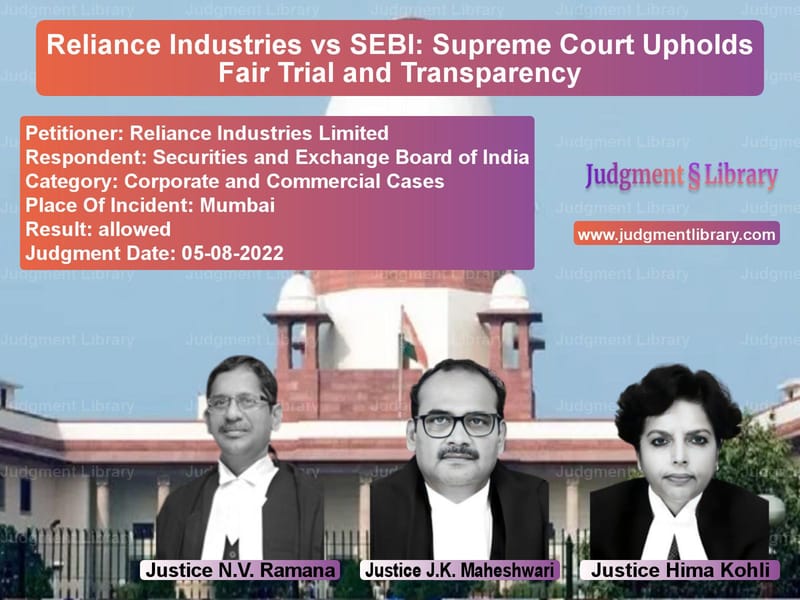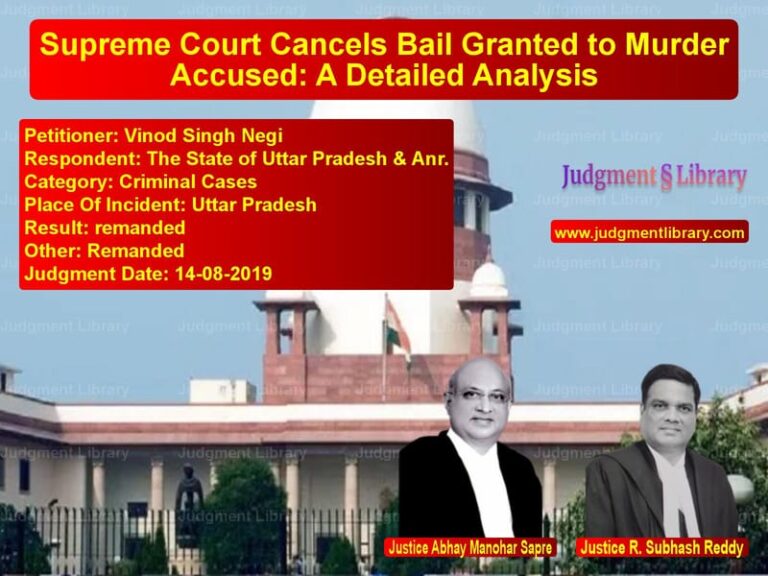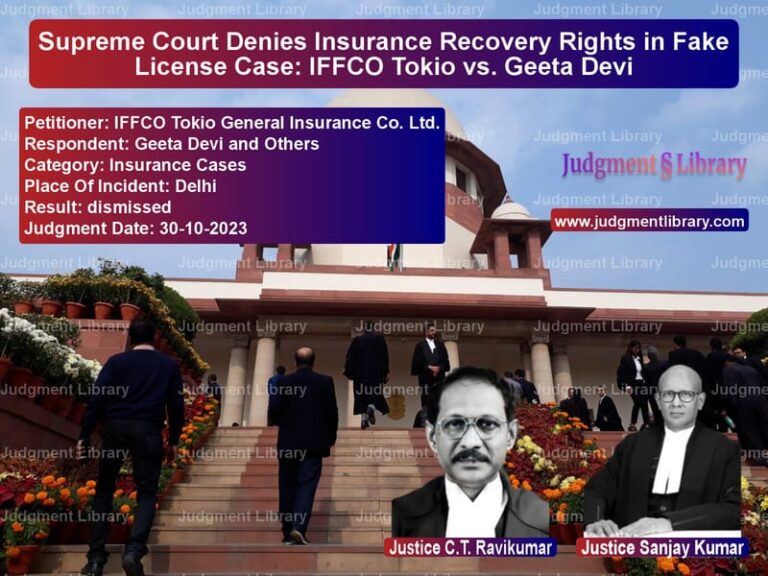Reliance Industries vs SEBI: Supreme Court Upholds Fair Trial and Transparency
The legal dispute between Reliance Industries Limited (RIL) and the Securities and Exchange Board of India (SEBI) has spanned over two decades, rooted in allegations dating back to 1994. This case centers on claims that RIL fraudulently allotted shares to connected entities, which SEBI later investigated. The matter reached the Supreme Court, where the core issue was SEBI’s refusal to disclose crucial documents to RIL, which the company argued was essential for its defense.
In a landmark judgment, the Supreme Court ruled in favor of RIL, directing SEBI to disclose key documents, including the expert opinions of Justice (Retd.) B.N. Srikrishna and Chartered Accountant Y.H. Malegam. The ruling highlights the fundamental principles of fair trial and transparency, emphasizing that regulatory authorities must operate in an unbiased and accountable manner.
Background of the Case
The case originated from a complaint filed in 2002 by Shri S. Gurumurthy with SEBI, alleging that RIL had fraudulently allotted 12 crore equity shares to entities connected with its promoters. The complaint suggested that these entities were indirectly funded by RIL and its group companies, thereby violating Section 77 of the Companies Act, 1956.
SEBI initiated an investigation into these allegations, and an investigating officer submitted a report in 2005. However, SEBI initially chose not to take any action against RIL, as the report did not establish any clear violation. Despite this, a note prepared by SEBI’s Legal Affairs Department in 2006 suggested seeking an external opinion on the matter. Accordingly, SEBI consulted Justice (Retd.) B.N. Srikrishna, who provided his first opinion, which was partially disclosed to RIL.
Key Events Leading to Supreme Court Appeal
- In 2010, SEBI accused RIL of funding the purchase of its own shares through related entities, violating the Companies Act and SEBI regulations.
- RIL responded by requesting copies of all relevant documents, including Justice Srikrishna’s full opinion, but SEBI denied full access.
- In 2011, the Ministry of Corporate Affairs issued an office memorandum stating that Section 77 of the Companies Act did not apply to the transaction in question.
- RIL filed a settlement application before SEBI in 2011, but SEBI did not finalize the matter.
- In 2017-18, SEBI revisited the case and sought a second opinion from Justice Srikrishna, who recommended consulting Y.H. Malegam, a prominent Chartered Accountant.
- Malegam’s report was submitted to SEBI, following which Justice Srikrishna issued a second opinion.
- RIL again requested these documents in 2019, but SEBI refused, citing legal privilege.
- SEBI eventually filed a criminal complaint in 2020, which was dismissed by the SEBI Special Court due to the statute of limitations.
- SEBI challenged this dismissal in the Bombay High Court, during which RIL filed an interim application seeking disclosure of the withheld documents.
- The High Court deferred the issue, leading RIL to appeal to the Supreme Court.
Petitioner’s Arguments (Reliance Industries Limited)
Senior Counsel Harish Salve, representing RIL, made the following arguments:
- SEBI has a constitutional obligation under Article 21 to ensure fair proceedings, which includes document disclosure.
- Regulatory proceedings are not adversarial litigation; hence, SEBI cannot claim litigation privilege over the documents.
- By selectively disclosing portions of Justice Srikrishna’s first opinion, SEBI engaged in “cherry-picking,” which is prejudicial to RIL’s defense.
- As a quasi-judicial body, SEBI is bound by principles of fairness and must disclose all documents relevant to the proceedings.
- SEBI’s refusal to disclose Malegam’s report and the second opinion of Justice Srikrishna creates an information asymmetry that denies RIL a fair opportunity to respond.
Respondent’s Arguments (SEBI)
Senior Counsel Arvind Datar, appearing for SEBI, countered RIL’s claims:
- The appeal was not maintainable as there was no ongoing criminal complaint following the Special Court’s dismissal.
- RIL’s demand for documents in a criminal revision proceeding related to a dismissal on limitation grounds was inappropriate.
- The requested documents were covered under litigation privilege as per the Indian Evidence Act.
- If the trial court takes cognizance of SEBI’s complaint, RIL can access documents under Section 207 of the CrPC, but not before.
- Disclosing internal reports and expert opinions would compromise SEBI’s ability to regulate securities markets effectively.
Supreme Court’s Key Observations
The Supreme Court made several important observations:
- SEBI’s investigation report from 2005 was inconclusive, and the Ministry of Corporate Affairs had already clarified that there was no violation of Section 77.
- SEBI’s reliance on Justice Srikrishna’s opinion and Malegam’s report for proceeding against RIL meant that these documents formed an integral part of the case.
- Opaqueness in regulatory proceedings fosters bias and is contrary to the principles of fairness and natural justice.
- By selectively disclosing parts of the opinion while withholding others, SEBI acted unfairly and violated the principle of transparency.
- The doctrine of “cherry-picking” in legal proceedings prevents selective disclosure of evidence that favors one party while suppressing exculpatory material.
Supreme Court’s Judgment
Based on these findings, the Supreme Court ruled in favor of RIL and directed SEBI to furnish the following documents:
- The first opinion of Justice (Retd.) B.N. Srikrishna.
- The report prepared by Chartered Accountant Y.H. Malegam.
- The second opinion of Justice (Retd.) B.N. Srikrishna.
The Court emphasized that the principles of natural justice require that an accused entity be given full access to all materials relied upon in a case. SEBI’s refusal to disclose these documents was found to be unjustified.
Conclusion and Impact of the Judgment
This ruling establishes a critical precedent on the transparency obligations of regulatory bodies like SEBI. The Supreme Court’s judgment underscores that regulators must not withhold relevant documents when initiating legal proceedings against entities. It also reinforces that accused parties have the right to access all materials forming the basis of allegations against them.
The case highlights the significance of procedural fairness in regulatory enforcement and is expected to have a lasting impact on corporate regulatory compliance and litigation in India.
Petitioner Name: Reliance Industries Limited.Respondent Name: Securities and Exchange Board of India.Judgment By: Justice N.V. Ramana, Justice J.K. Maheshwari, Justice Hima Kohli.Place Of Incident: Mumbai.Judgment Date: 05-08-2022.
Don’t miss out on the full details! Download the complete judgment in PDF format below and gain valuable insights instantly!
Download Judgment: reliance-industries-vs-securities-and-excha-supreme-court-of-india-judgment-dated-05-08-2022.pdf
Directly Download Judgment: Directly download this Judgment
See all petitions in Company Law
See all petitions in Corporate Governance
See all petitions in unfair trade practices
See all petitions in Judgment by N.V. Ramana
See all petitions in Judgment by J.K. Maheshwari
See all petitions in Judgment by Hima Kohli
See all petitions in allowed
See all petitions in supreme court of India judgments August 2022
See all petitions in 2022 judgments
See all posts in Corporate and Commercial Cases Category
See all allowed petitions in Corporate and Commercial Cases Category
See all Dismissed petitions in Corporate and Commercial Cases Category
See all partially allowed petitions in Corporate and Commercial Cases Category







